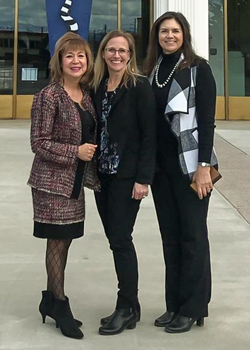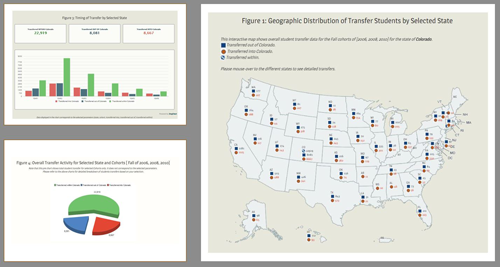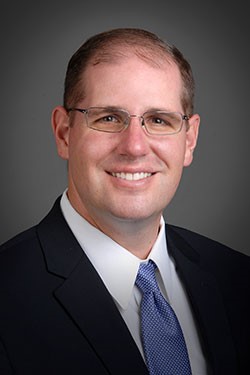NewsCap
February 2019 edition
A bimonthly newsletter of WICHE highlights and activities
Notes from the President
I hope you all had a wonderful holiday season and a happy new year! As you might imagine, these last few weeks have been a whirlwind as I’ve been settling into my new role as WICHE’s president. It’s truly an exciting time, so I wanted to take this opportunity to share with you what I’ve been doing these past several weeks and how I’ll be spending my time in the coming months.

WICHE president
I hope you all had a wonderful holiday season and a happy new year! As you might imagine, these last few weeks have been a whirlwind as I’ve been settling into my new role as WICHE’s president. It’s truly an exciting time, so I wanted to take this opportunity to share with you what I’ve been doing these past several weeks and how I’ll be spending my time in the coming months.
First and foremost, I’m shaping a vision to guide WICHE for the years to come. WICHE is a leader in higher education and a key partner in the West working to serve our students, but we can’t rest on our laurels. We have a tremendous opportunity to build on WICHE’s successful history and find new ways to support the organizational mission. Because I can’t do this in a vacuum, I’ve set a goal to visit all WICHE members in my first six months as president; I want to listen and learn directly from you and from partners throughout the region.
I had a great start in December when I participated in the Organizational Session for North Dakota’s 66th Legislative Assembly. There, I had the pleasure of meeting with Sen. Ray Holmberg, chair of the WICHE Commission, WICHE Commissioner Nick Hacker, and Legislative Advisory Committee members Rep. Bob Martinson and Rep. Mark Sanford, as well as Governor’s staff, legislative staff members, and colleagues at the North Dakota University System. Unfortunately, Commissioner Mark Hagerott and I missed each other during this visit, but our next Commission meeting is in Bismarck, so we’ll have plenty of time to connect then!

and Patricia Sullivan
During the first week of February, I spent two productive days in New Mexico’s state capitol. The “Roundhouse,” as it’s known, was bustling with excitement and energy as WICHE Commissioners Barbara Damron and Patricia Sullivan introduced me to Dr. Kate O’Neill, New Mexico’s new state higher education executive officer, as well as state legislators and legislative staff, Governor’s office staff, higher education leaders, and other wonderful folks. And one of my favorite moments was meeting Stan Rounds, executive director of the New Mexico Coalition of Education Leaders who had been a proud WICHE intern in 1969!
My travels continue in the coming weeks to Arizona, California, Oregon, Wyoming, Idaho, and (in June) Hawaiʻi.
I’m also collaborating with national partners to continue WICHE’s role as a leader in higher education policy and practice. I’m excited to begin service on the NC-SARA board, and I’ll participate in my first meeting in May. I’ll also join regional and national higher education leaders on the national advisory council for the Association of Public and Land-Grant Universities’ Powered by Publics: Scaling Student Success initiative. Launched in November, this initiative involves 128 institutions and two state systems, and is organized into 14 “clusters” around shared priorities related to undergraduate retention and degree completion.
Finally, I’m working with staff to find ways to better support their work to advance WICHE’s mission of increasing access to high-quality higher education for residents of the West by promoting successful student outcomes, vibrant economies, and strong leadership.
Things are moving fast, and there’s a lot to learn, but every day I am grateful for the opportunity to serve the region. I look forward to the action-packed months ahead, and in the meantime, please let us know how WICHE can be of help to you or your organization.
WICHE Student Access Programs save students $417+ million this year
“My goal is to work in under-resourced communities, where access to health care is limited,” says Leah, a Washington resident pursuing professional nursing education at the University of Hawai‘i. “Thanks to WICHE’s Western Regional Graduate Program, my tuition costs are half what they would have been. Instead of worrying about paying back graduate loans, I can focus on being the best health care provider I can be.”
Leah is one of more than 42,500 Western students who have benefited this year from WICHE’s three Student Access Programs, which reduce nonresident tuition costs for students at hundreds of public college and university programs.
The most popular of the three, the Western Undergraduate Exchange (WUE), has seen 40,487 students save $380.5 million this year on nonresident tuition at more than 160 Western public associate’s or bachelor’s degree institutions. WUE students pay no more than 150 percent of that school’s resident rate, which saves them $9,300 a year on average.
The Western Regional Graduate Program (WRGP) has enabled 1,478 students to pay resident tuition at 700+ out-of-state graduate programs at some 60 Western public universities. The Professional Student Exchange Program (PSEP)—in which participating states subsidize tuition for residents pursuing select high-demand health degrees in other states—has helped 614 students affordably pursue those degrees and (as 67 percent do) return home to fill provider gaps.
View Student Access Programs: By the Numbers, WICHE’s annual report on these programs that contains detailed participation data and state-by-state dashboards.
WICHE awarded $900,000 for initiative exploring recognition of learning
With support from a $700,000 grant from Lumina Foundation and $200,000 in funding from Strada Education Network, WICHE’s Policy Analysis and Research unit will lead an 18-month initiative focused on recognition of learning—a term that encompasses varied ways students can be granted academic credit for prior knowledge gained outside the classroom (whether through life experience, military training, volunteerism, or other avenues).
The project’s goal is to explore ways to better assess traditionally undervalued facets of learning, and to identify policies and practices that can enable the affordable scaling of such assessments to benefit students, institutions, and states alike. The initiative builds on two previous Lumina-supported WICHE projects focused on adult-learning populations: the Adult College Completion Network and Nontraditional No More. Read more about this initiative here.
New digital tool illuminates state and national transfer trends

An online tool developed by Interstate Passport® to track postsecondary student transfers in the WICHE region has been expanded to include all U.S. states and territories.
The new Student Transfer Destinations by Statewebsite provides snapshots of transfer trends and patterns among cohorts over a 10-year period, and displays where students are transferring to and from across state lines. The site is based on and will be regularly updated with data from the National Student Clearinghouse Research Center.
April community college leaders meeting to showcase exemplary
workforce-development programs

The Western Alliance of Community College Academic Leaders (Alliance) Annual Meeting, to be held April 3-5 in Salt Lake City, will offer attendees a chance to learn more about designing and delivering cutting-edge training programs for the workers of tomorrow.
Speakers range from noted futurist James Dator of the University of Hawai‘i at Manoa, to presidents of several Aspen Prize-winning community colleges, to employers representing construction, automobile, and manufacturing industries. Meeting highlights include a tour of Salt Lake Community College’s new Westpoint Workforce Training and Education Center. Early bird registration closes Feb. 20; the regular registration deadline is March 13.
WICHE introduces new VP, staffers
Patrick Lane has been appointed WICHE’s vice president for policy analysis and research. Lane has been at WICHE for over 10 years, most recently as director of data initiatives, and has managed the Multistate Longitudinal Data Exchange, which seeks to improve linkages between state data systems to better answer policy questions about human capital development and mobility. In this role he replaces Demarée Michelau, who was appointed WICHE president in November.
WICHE also welcomes new staff members Deirdre Coulter, director of human resources; Gina Brimner, director of veteran’s initiatives for the Behavioral Health Program; and Vanessa Gonzalez, technical assistance associate for the Behavioral Health Program.
WCET has seat at the table to discuss proposed federal regulatory changes
Russ Poulin, senior director for policy, analysis, and strategic alliances for the WICHE Cooperative for Educational Technologies (WCET), has been appointed to a Distance Learning and Educational Innovation Subcommittee panel charged with making recommendations to the U.S. Department of Education on proposed rule changes in areas ranging from accreditation to distance learning to competency-based education. The committee conducted the first of three sessions in late January.
This Jan. 30 WCET Frontiers blog post by Poulin and Cheryl Dowd, director of the State Authorization Network, offers an overview of the negotiated rulemaking process, as it’s called, and a summary of regulatory changes under consideration.
Grow your enrollment through WICHE’s graduate tuition-savings program
Institutions looking to increase their graduate programs’ enrollment—and the geographic and ethnic diversity of their student body—are invited to explore the benefits of the Western Regional Graduate Program (WRGP), which allows Western students to attend select out-of-state graduate certificate, master’s, and doctoral programs, yet pay the resident tuition rate.
Participation in WRGP is more streamlined than ever. Programs are no longer required to demonstrate “distinctiveness” or submit detailed application proposals. Each participating university may now decide which programs they make eligible for the WRGP discounted-tuition rate. You can browse eligible programs through the WRGP Savings Finder. For more information, contact WICHE Student Access Program Director Margo Colalancia at 303.541.0214.
Check out WCET’s revamped platform for sharing news, ideas, and expertise

WCET recently launched wcetMIX, a new platform designed to make it easier for WCET’s 380 members to share information, collaborate with one another, and access current and archived online discussions of higher education topics.
These past few weeks, wcetMIX topics discussed include the optimal marketing of campus-based instructional design services, adapting LMS software to comply with online offerings in China, and online-authentication vendors. To join the mix, and learn more about the benefits of WCET membership in general, visit this page.
New federal grants to bolster campus sexual violence-prevention efforts
The U.S. Department of Justice is accepting applications for three-year, $300,000 grants to strengthen postsecondary institutions’ efforts to reduce on-campus sexual assault, stalking, and domestic and dating violence, and to hold offenders accountable. Longmont, Colo.-based advocacy organization Casa de Esperanza is helping colleges and universities with the application process and is a great resource for minority-serving institutions. Contact Maria Cristina Pacheco for more info, and apply for the grant by March 14.
WICHE has a longstanding commitment to reducing sexual violence on campuses. Contact us to learn more about prevention assessment and other resources WICHE can provide.
Save the date!
- Feb. 25: Interstate Passport webinar: The Transfer Landscape in the U.S., by Doug Shapiro, executive research director of the National Student Clearinghouse Research Center
- March 6-7: State Authorization Network (SAN) 2019 Back to Basics Workshop, Arlington, Va.
- April 3-5: Western Alliance of Community College Academic Leaders (Alliance) Annual Meeting, Salt Lake City
- April 24-26: Western Academic Leadership Forum (Forum) Annual Meeting, Boulder, Colo.
- May 20-21: Biannual WICHE Commission Meeting, Bismarck, N.D.
- June 4-5: WCET Leadership Summit on workforce partnerships, Newport Beach, Calif.
On the road: Selected recent and upcoming WICHE-led presentations
- Policy Analysis and Research staff and co-host Lumina Foundation at a meeting of state teams participating in the WICHE Task Force on Closing Postsecondary Attainment Gaps, Dec. 11-12, 2018 in Salt Lake City.
- Interstate Passport staff at a meeting with Passport campus liaisons, Jan. 25 in Honolulu; at the Passport Review Board Annual Meeting, Jan. 31-Feb. 1 in Boulder, Colo.; and at the Higher Learning Commission 2019 Annual Conference, April 5-9 in Chicago
You heard it from WICHE

“Joining the Interstate Passport Network allows us to better align lower-division general education learning outcomes with partner schools, improving the transfer process. Quicker evaluations of transcripts, reduced duplicate courses, and faster time to degree are exactly the kind of attributes we look forward to extending to our students.”
– Kyle Moore, associate vice provost for enrollment management at the University of Wyoming, in an interview with Sheridan Media
